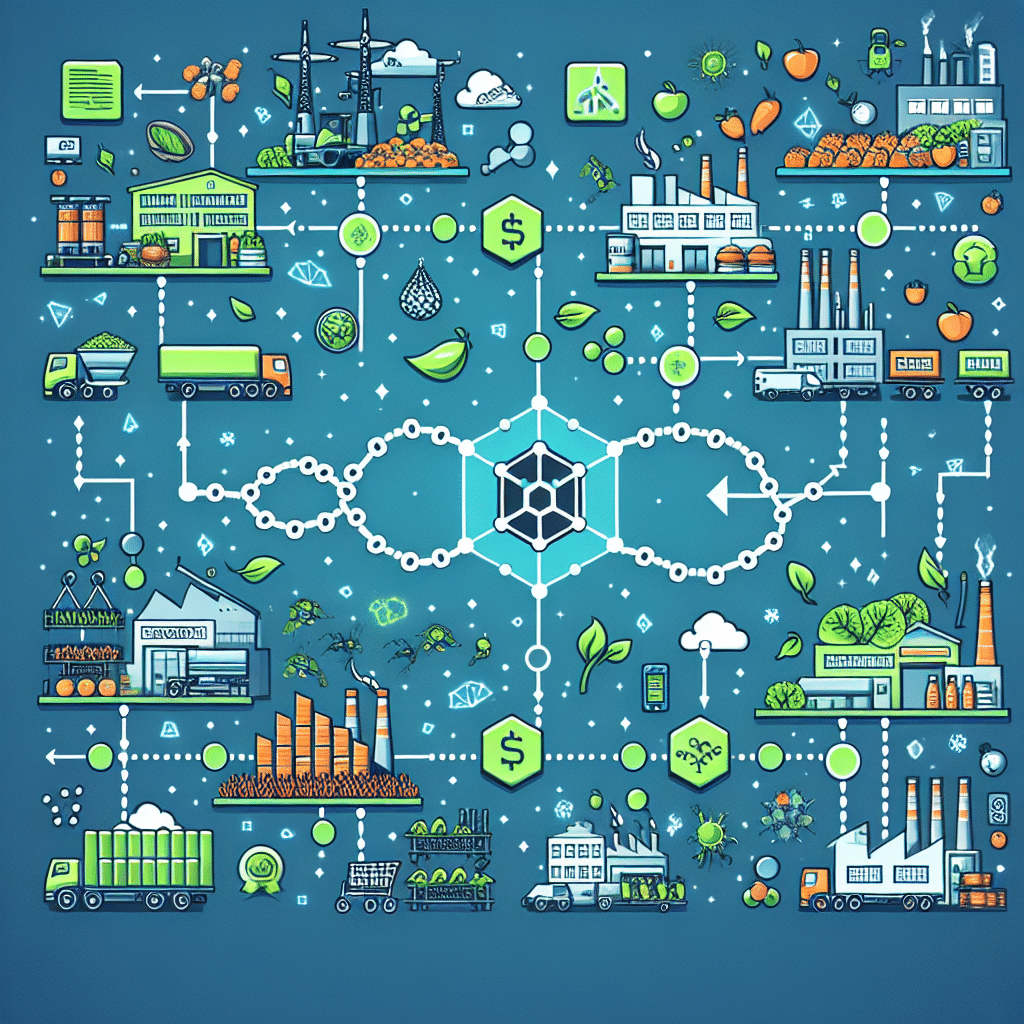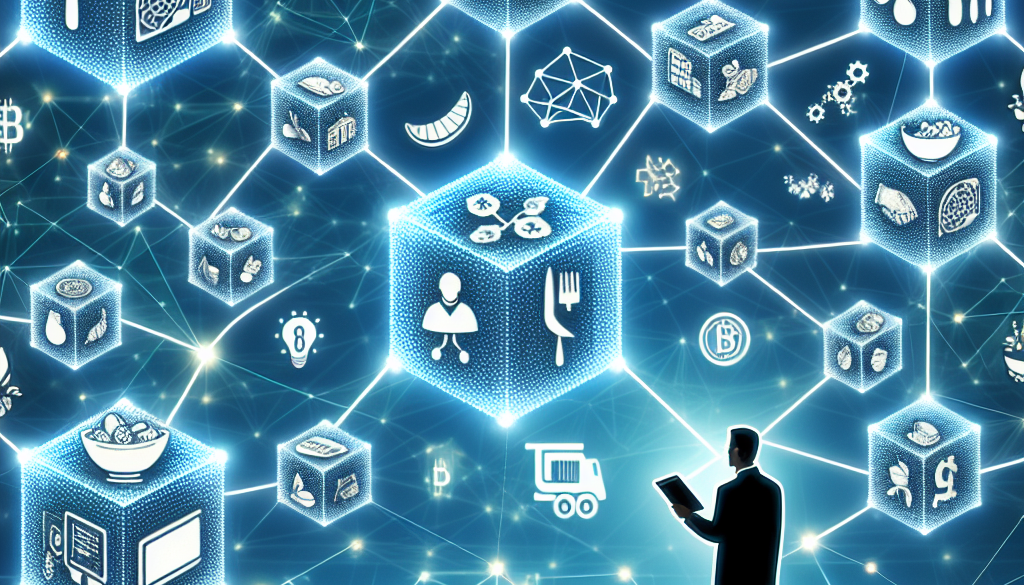Role of Blockchain in The Transition of the Food And Beverages Industry
-
Table of Contents
Blockchain Revolutionizing the Food and Beverage Industry

The food and beverage industry is undergoing a significant transformation, with blockchain technology at the forefront of this change. Blockchain, a system of recording information in a way that makes it difficult or impossible to change, hack, or cheat the system, is proving to be a game-changer for the sector. This article explores the role of blockchain in the transition of the food and beverage industry, highlighting its impact on supply chain management, food safety, traceability, and consumer trust.
Enhancing Supply Chain Transparency and Efficiency
One of the most significant applications of blockchain in the food and beverage industry is in supply chain management. Blockchain’s decentralized ledger provides a transparent and immutable record of every transaction that occurs from farm to table, ensuring that all stakeholders have access to the same information.
- Traceability: Blockchain enables the tracking of products at every stage of the supply chain, from the source of raw materials to the end consumer. This level of traceability is crucial for verifying the authenticity of products and their compliance with safety standards.
- Reduced Fraud: The immutable nature of blockchain records helps in reducing fraud and errors, as each transaction is verified by multiple parties and cannot be altered retroactively.
- Efficiency: By automating processes and reducing the need for intermediaries, blockchain can streamline operations, leading to faster transactions and reduced costs.
According to a report by MarketsandMarkets, the global blockchain in agriculture and food supply chain market is expected to grow from $60.8 million in 2018 to $429.7 million by 2023, at a Compound Annual Growth Rate (CAGR) of 47.8% during the forecast period.
Improving Food Safety and Quality Control
Food safety is a paramount concern for consumers and regulators alike. Blockchain technology can significantly enhance food safety measures by providing a reliable and unalterable record of food origins, handling, and storage conditions.
- Rapid Response to Contamination: In the event of a food safety issue, blockchain can quickly identify the source and distribution path of the contaminated product, enabling a swift and targeted recall.
- Regulatory Compliance: Blockchain can help businesses comply with food safety regulations by maintaining a complete and accessible record of compliance data.
- Quality Assurance: Consumers can access blockchain data to verify the quality and authenticity of food products, including organic or fair-trade certifications.
A study by Juniper Research suggests that blockchain, along with IoT sensors and trackers, could save the food industry $31 billion in food fraud savings by 2024 by efficiently tracing products in the supply chain.
Building Consumer Trust Through Transparency
Blockchain technology can help food and beverage companies build trust with consumers by providing them with transparent information about the products they purchase.
- Product Histories: Consumers can use blockchain to access detailed histories of products, including where ingredients were sourced, how products were processed, and how they were transported.
- Authenticity Verification: Blockchain can combat counterfeit products by providing a secure and verifiable record of a product’s authenticity.
- Consumer Engagement: By offering greater transparency, companies can engage with consumers who are increasingly interested in the ethical and environmental implications of their food choices.
A survey by Label Insight revealed that 94% of consumers are likely to be loyal to a brand that offers complete transparency, and 73% are willing to pay more for a product that offers complete transparency.
Challenges and Considerations
While blockchain presents numerous opportunities for the food and beverage industry, there are also challenges to consider:
- Integration with Existing Systems: Companies must find ways to integrate blockchain technology with their current IT infrastructure.
- Standardization: There is a need for industry-wide standards to ensure interoperability between different blockchain systems.
- Education and Adoption: Stakeholders across the supply chain must be educated about blockchain technology and its benefits to encourage adoption.
Conclusion
The role of blockchain in the food and beverage industry is becoming increasingly important as companies strive to meet consumer demands for transparency, safety, and quality. By enhancing supply chain management, improving food safety protocols, and building consumer trust, blockchain is poised to drive significant change in the industry. As the technology matures and adoption grows, we can expect to see a more efficient, transparent, and trustworthy food system emerge.
Discover ETprotein’s High-Quality Protein Products
In line with the advancements in the food and beverage industry, ETprotein offers a range of high-quality protein products that cater to the evolving needs of consumers. Their organic bulk vegan proteins and L-(+)-Ergothioneine (EGT) are ideal for companies looking to innovate and provide health-conscious options to their customers. With a commitment to non-GMO, allergen-free ingredients, and high purity levels, ETprotein’s products are perfectly suited for the modern food and beverage landscape.
About ETprotein:
ETprotein, a reputable protein and L-(+)-Ergothioneine (EGT) Chinese factory manufacturer and supplier, is renowned for producing, stocking, exporting, and delivering the highest quality organic bulk vegan proteins and L-(+)-Ergothioneine. They include Organic rice protein, clear rice protein, pea protein, clear pea protein, watermelon seed protein, pumpkin seed protein, sunflower seed protein, mung bean protein, peanut protein, and L-(+)-Ergothioneine EGT Pharmaceutical grade, L-(+)-Ergothioneine EGT food grade, L-(+)-Ergothioneine EGT cosmetic grade, L-(+)-Ergothioneine EGT reference grade and L-(+)-Ergothioneine EGT standard. Their offerings, characterized by a neutral taste, non-GMO, allergen-free attributes, with L-(+)-Ergothioneine purity over 98%, 99%, cater to a diverse range of industries. They serve nutraceutical, pharmaceutical, cosmeceutical, veterinary, as well as food and beverage finished product distributors, traders, and manufacturers across Europe, USA, Canada, Australia, Thailand, Japan, Korea, Brazil, and Chile, among others.
ETprotein specialization includes exporting and delivering tailor-made protein powder and finished nutritional supplements. Their extensive product range covers sectors like Food and Beverage, Sports Nutrition, Weight Management, Dietary Supplements, Health and Wellness Products, and Infant Formula, ensuring comprehensive solutions to meet all your protein needs.
As a trusted company by leading global food and beverage brands and Fortune 500 companies, ETprotein reinforces China’s reputation in the global arena. For more information or to sample their products, please contact them and email sales(at)ETprotein.com today.












